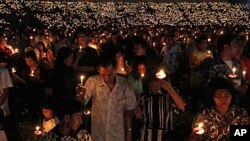Members of the Batak Christian Protestant Church must find a new place to worship after protesters forced them to evacuate seven of the homes where they had been holding church services. The protesters - Muslim hardliners - say the Christians were engaged in illegal religious activity.
The incident turns a sharp eye on intolerance in a country U.S. President Barack Obama recently hailed for its religious pluralism.
Sunday's protesters included supporters of the Islamic Defenders Front, a radical Islamic group known for its confrontational tactics, as well as members of several conservative Muslim movements.
According to Indonesian law, homes may not be used for religious services. However, the Batak Christians say they are forced to use their homes to worship because the government has not allowed them to build a church.
A 2006 ministerial decree requires religious groups with more than 90 members to secure the support of 60 local residents before they can build a new house of worship. They must also get majority approval from a panel of both district and provincial religious leaders.
Rights groups say the regulation has been used to justify a rash of attacks around Jakarta in recent months. Some lawmakers have called for new legislation that would ensure religious harmony. Andreas Harsono, from Human Rights Watch, says the regulation is too restrictive.
The house of worship decree is basically enforced when people are going to establish churches, but it is not being enforced if they would like to build mosques. So, in that sense, this decree is discriminative against minorities in Indonesia," said Harsono.
Human Rights Watch has called on the Indonesian government to stand by the constitutional guarantee for religious freedom by reviewing the house of worship decree.
But officials from the Religious Affairs Ministry say the regulation is necessary to prevent sectarian conflict in mixed religious communities.
They say internal issues, such as establishing a place of worship or determining whether something is forbidden according to Islam, goes beyond their authority.
Nasaruddin Umar is the head of Islamic guidance at the Ministry of Religious Affairs. He says the government only manages religious relations so that they will not lead to conflict. The government does not interfere in any religion's beliefs or affairs.
Indonesia has the world's largest Muslim population, but the government is secular and recognizes peoples' right to worship one of six state-sanctioned religions, including Christianity.
Rights groups criticize President Susilo Bambang Yudhoyono for failing to take action against violent extremists. They say the torching and forced closure of churches show that intolerance is on the rise here.
Groups that support religious pluralism say the government has a responsibility to protect people's right to worship, by cracking down on those who violate the constitution, even if it does not lead to conflict.
Confrontation between Protestants and Muslims in the suburbs surrounding Jakarta has increased, in recent months. Although Sunday's incident did not result in violence, a few church leaders were stabbed and beaten during a clash in Bekasi in September.
Bonar Tigor Naipospos, the head of the Setara Institute for religious pluralism, says that Indonesian society is very tolerant and religiously moderate. However, surveys the organization has taken on relations between different religious groups indicate that the mixing of different ethnic groups, particularly around Jakarta, has created new tension.
"This is an urban phenomena and especially where the radical organizations exist. So this is why from our survey, most of the threats to religious freedoms is in Jakarta and West Java, where the radical organizations are located and active," he said.
A small group of extremists known as Jemaah Islamiya has been responsible for a series of bombings in the country, in the past decade, that have killed more than 220 people. They generally targeted bars, restaurants and hotels known to have foreign patrons. The Indonesian government has arrested, tried and convicted scores of J.I. members, and the movement appears to have little public support.
However, in the run up to the Christmas period, the government has put the police on alert for terrorist attacks against Christians. In 2000, terrorists attacked a series of churches in Jakarta on Christmas Eve. And, in recent weeks police have uncovered several unexploded bombs outside churches in Central Java.
Religious Tensions Rise in Indonesia




